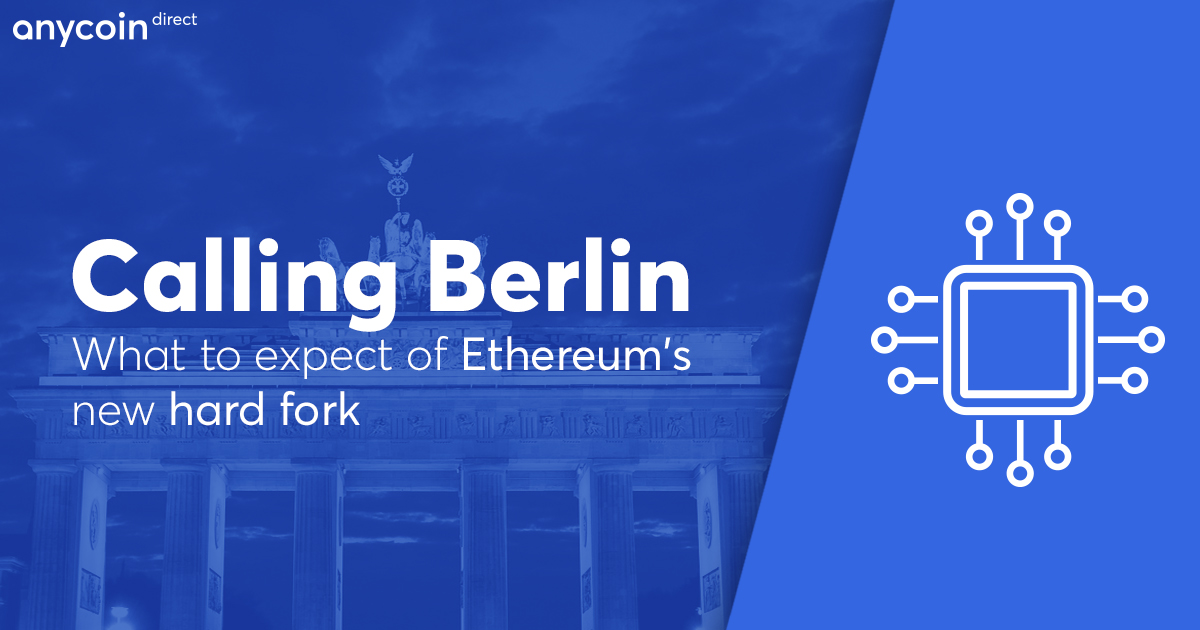Berlin Update - What to expect of Ethereum's hard fork
- 5 minute read

On block 12,244,000 the Berlin mainnet upgrade will be de deployed on the Ethereum network. After months of planning, the upgrade follows the important Istanbul and Muir Glacier updates, setting the stage for ETH2.0. In today’s article, we will give you a short overview of what to expect and whether any additional actions are required.

The road to 2.0
We can’t pinpoint the exact date and time, but block 12,244,000 is expected to be reached on the 15th of this week. The Berlin upgrade will introduce four Ethereum Improvement Proposal’s which are simply called EIP’s. Due to the decentralized nature, EIP’s take quite some time to be proposed, discussed, implemented and eventually deployed. After a long run-up, the following four EIP’s will be launched:
- EIP-2565: Lowers the cost of the ModExp (0x00..05) precompile. ModExp helps with the calculation of gas costs, which are currently very high.
- EIP-2929: Increases gas cost for SLOAD, *CALL, BALANCE, EXT* and SELFEDESTRUCT when used for the first time in a transaction. This might seem counterintuitive with the current gas prices, but research has shown that the current ‘core opcodes’ are underpriced. By raising the gas costs of these specific ‘core opcodes’, the network can prevent spam and DoS attacks.
- EIP-2718: Introduces a new transaction type that is an envelope to enable easier support for multiple transaction types. At the moment, all transactions are treated equally. With this update, certain transactions can be labelled with a certain type and can be handled independently.
- EIP-2930: Adds a transaction type that contains an access list, a list of addresses and storage keys that the transaction plans to access. This mitigates some of the gas cost increases introduced by EIP-2929.
Geth v1.10.2 out! Lots of fixes all around in preparation for the Berlin hard fork. #golang #Ethereumhttps://t.co/WvmOWHP6Jc
— Go Ethereum (@go_ethereum) April 8, 2021
Do I have to do anything?
If your Ethers are stored on an exchange, hardware, mobile or web wallet you won’t have to do anything (unless specifically asked by your wallet provider). The update will deploy automatically. If you are a node operator or a miner, you need to download the latest version of the Ethereum client once the upgrade has been completed. This client can be found here. If you do not upgrade your client, you will synchronize to the pre-fork upgrade and you won’t be able to send or receive any Ethers.
A year ago I shared these charts showing #EIP1559 will literally give $ETH a higher stock to flow than $BTC. Since then there's been much discussion & ETH as money is becoming a mainstream narrative. 🌐🖥️💎 https://t.co/5Hkd6WnWKd pic.twitter.com/Di86McgWVC
— Alex Saunders 🇦🇺👨🔬 (@AlexSaundersAU) April 3, 2021
EIP-1559
The long-awaited improvement EIP-1559 will not be implemented with the upcoming Berlin update. EIP-1559 has previously been called ‘the final puzzle to Ethereum’s monetary policy and will tackle the overall user experience of Ethereum’s gas management. The current auction-style mechanism is perceived as confusing and leads to the overpayment of network validators. EIP-1559 will affect the transaction costs for users and the income for miners while keeping the inflation in check. The update is expected later this year, in Q3 or Q4.


